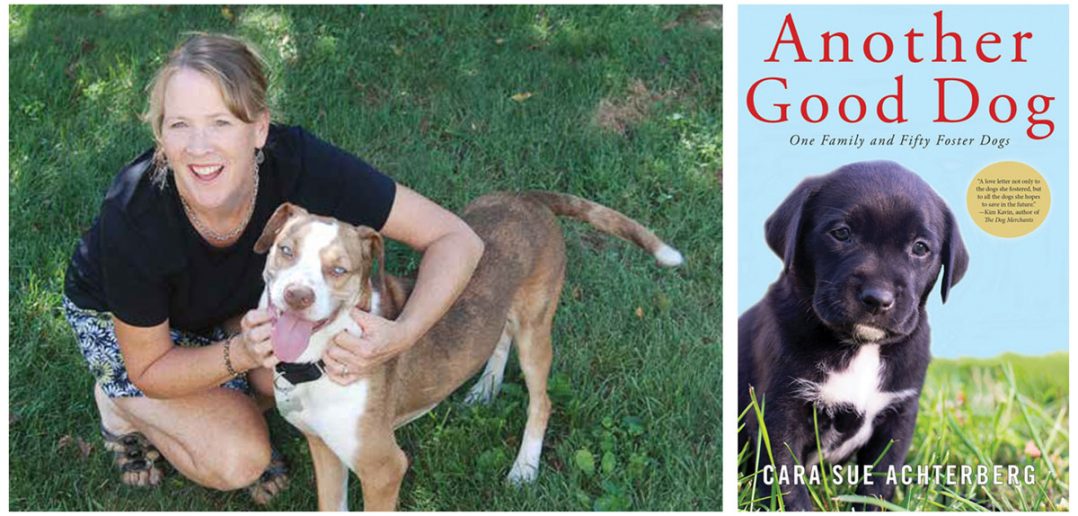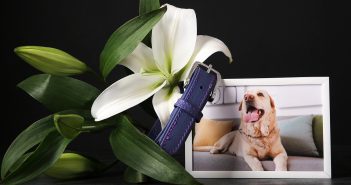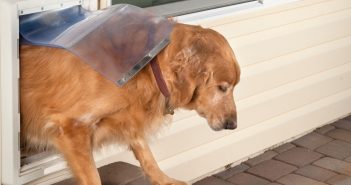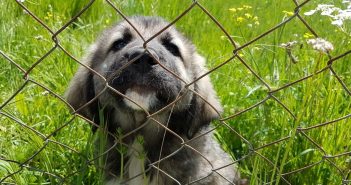If you’re looking for the next pet-related book to have on your nightstand, this is a great pick. I had never heard of Cara Sue Achterberg before receiving an email introduction about this book she’s written, but the more I learned about her and her writing, the more I felt it was inevitable that she (virtually) cross my path at precisely the moment she did.
Disclosure: I received a preview copy of the book prior to it being available for sale – which in no way influences whether I’ll like a book or not. If anything, it makes me scrutinize it harder than if I had purchased it for myself.
Before I even agreed to receive the PDF preview of the book, I took a peek at her Another Good Dog blog which lead me to her CaraWrites.com website where I was drawn immediately to the Cowboy Mom section where I found a partial work in progress about, in her words, “how an unbroken horse taught me to be a better parent and person.”
As a life-long horse lover (is there really any other kind), I was drawn in immediately. I read it. I was hooked on both the piece of that story she shared there as well as the way she writes. It’s lovely. Conversational. I felt immediately immersed and connected, perhaps because I’ve accepted the non-riding stage of my own life for the past 20 years, though I’ve continued to have horses in my pastures.
A Bit About Cara Sue Achterberg
She’s a freelance writer, a blogger, a novelist, a mother, a wife, and an animal lover. She lives on a hillside in Freedom, Pennsylvania with her (quote) “three remarkable children (when they’re home), mostly adoring husband, under-utilized horses, socially awkward dog, ever-changing foster dogs, two perfect kitties and too many chickens” (end quote). Her words. Aren’t they lovely?!
She’s written three novels: I’m Not Her (2015), Girls’ Weekend (2016), and Practicing Normal (2017). She also wrote Live Intentionally, a guidebook of sorts for living a more organic life (based on one of her long-running blogs).
About Another Good Dog
I’m a novelist by trade but have written a blog about our fostering experiences for over three years. My agent convinced me to pull together a book on the topic and that book will be released from Pegasus Books this summer. I wrote Another Good Dog because I believe with all my heart that fostering is the best way to help overcrowded, underfunded shelters. More importantly, it’s a way to save more dogs and have the best chance for a good match between adopter and dog. To that end, this book is more than a memoir — it’s my mission.
Cara Sue Achterberg
Although I loved Cara’s writing style from her blogs, I have to admit I wasn’t totally looking forward to reading an entire book devoted to fostering dogs. I respect those who are willing and able to do it, but I haven’t ever considered it myself. I’ve rescued my fair share of animals – lots of them – from friends, and friends of friends, from vet offices, and pounds . . . but I’ve never thought of fostering an animal and my only experience with adopting an animal from wasn’t a good one.
My objections to officially fostering? I’d get way too attached. I’d never be able to turn them over. I’d probably never get approved to foster dogs in the first place and I wasn’t a fan of the information required on adoption applications, either.
On the surface, Cara’s book really is a simple memoir – an account of how she entered into the idea of fostering dogs in the first place through the first 50 dogs she and her family fostered (in less than 2 years). Or you could say it chronicles her foster experience from Galina, the sweet little beagle with floppy ears and freckles, to Edith Wharton, the pregnant (as it turned out heartworm positive) dog who gave birth to a dozen puppies.
What I expected was a book that would be full of fun, anecdotal stories about the various foster dogs and a filtered picture what daily life is like. It is that, without the filter. I also expected to feel occasionally shamed for not being a foster, or ever really considering being a foster. I never did. I was simply engulfed in her story.
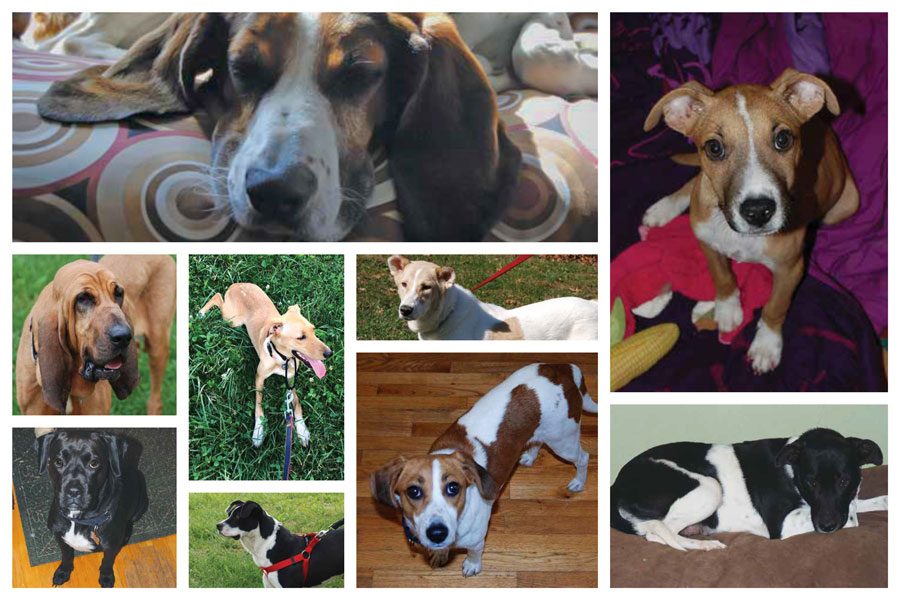
Some of the dogs Cara’s fostered and talks about in her bookl
What I didn’t expect was to discover she’d had an experience that wasn’t all sunshine and roses when she’d attempted to adopt a dog and she’d had the same reservations I currently have about fostering and the dog adoption process . . .
Finally, I found a dog that seemed like a good fit. He was a young border collie at a kill shelter in Maryland, about a forty-minute drive from us. We were told we couldn’t meet him until we’d been approved, so I filled out yet another application and listed references. Over a lengthy phone interview, I answered questions about our income, family members, habits, dog knowledge, and how we would care for this dog if we were approved.
It hadn’t been nearly as complicated when we’d adopted Gracie only five years before. She’d come through a rescue. It had only been a matter of a few emails before we drove to her foster home and picked her up.
A few days later I got an email telling me that there was no need for a home visit. I had not been approved. What? We’d had Lucy for seventeen years and Gracie for six now. Wasn’t that evidence enough that we could provide a good, safe home for any dog? No, I was told; our invisible fence was not a safe situation for dogs. When I explained to my friends why we weren’t adopting the border collie, they told me to apply for a different dog but not mention the fence. It wasn’t as if anyone would see it if they came for a home visit. After all, it was invisible.
I considered this option, but in the end lying or not lying wasn’t the point. There was nothing wrong with keeping a dog in an invisible fence. Let’s see—the options are incinerate the dog because we can’t afford to shelter it any longer, or let someone adopt it and keep it in an invisible fence? Which is worse? AGH. The policy was stupid, and I told the shelter contact that in a lengthy email. I never heard from her again.
Cara Sue Achterberg, Another Good Dog
I found myself nodding. Yep, that’s how it goes with rescue groups and foster programs. They ask for way more information than I’m willing to give. I’m not about to disclose our entire routine (or lack thereof) or include a copy of last year’s taxes to be “worthy” of adopting a dog.
She goes on, trying to find a good dog to adopt, but along the way she keeps running into foster groups and starts to consider fostering as a way to find ‘another good dog.’ Her husband, Nick, points out the fatal flaw in her plan:
Every time I turned on the computer there was another mention of fostering. “Maybe we could foster dogs,” I said to Nick. “Essentially give them a try out, and keep the one that’s best.”
“You’d never be able to give a dog back,” warned Nick. “We’d end up with twenty dogs.”
Cara Sue Achterberg, Another Good Dog
Yep, I’d end up with 20 dogs, too, if I tried fostering dogs. Cara plunges in anyway, informally and without any real planning when she comments on a post she sees . . .
When another hound dog appeared with an outfit called Operation Paws for Homes, I commented on the post, casually. “We might be able to foster this dog,” I wrote.
Immediately I got a message back with a link to an application. What the heck, I thought. They’ll never approve me with my invisible fence. I filled out the form, clearly stating our dangerous fence. I got an email back that same day asking when could I talk. Maybe they had only skimmed my application. Maybe they hadn’t noticed my big bad fence.
Cara Sue Achterberg, Another Good Dog
OPH turns out to be a great fit for her and before she knows it she’s immersed in the world of fostering dogs with the group. While she’d first considered fostering as a way to “test-driving” Lucy replacements, that changes as she becomes more involved with fostering:
Somewhere along the line, the idea of adopting a dog to fill the hole Lucy left got overshadowed by a feverish desire to help as many dogs as possible. It wasn’t time yet to stop.
Cara Sue Achterberg, Another Good Dog
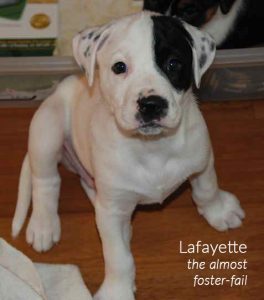 That’s it. She’s hooked.
That’s it. She’s hooked.
From the brutally honest account of her attempt to adopt a border collie through her foray into the OPH world of fostering and what it’s actually like to foster dogs – with all of the utter joy, heartache and un-filtered, un-rosy details that includes – I started to understand not only how she got there, but how I might someday see myself as interested in fostering, too.
We’ll done, Cara, well done.
What I really didn’t expect from this book is the overarching glimpse into her world reaching me in such a profound way. While it is a journal of the events of one family and fifty foster dogs, it is also, ultimately, a journal of a mom learning to let go. Of foster dogs – and of children. A mom who’s trying to orchestrate the chaos and ride the changing tides of time and parenthood.
This line from the book pretty much sums up my life for the past couple of decades (raising children amidst horses and dogs and working from home):
And yet, it is the tyranny of the urgent that dictates our days, isn’t it?
Cara Sue Achterberg, Another Good Dog
Well yes, Cara, yes it is!
Beyond sharing a love of dogs (and horses), I, too – at precisely this moment in my own lift – have an 18 year old son who is already “mentally checking out of this inn” and a daughter who’s just literally checked out (leaving home for her 3rd year of college), so I often found myself nodding and tearing up as I read passages like these:
I’d had all these ideas about the kind of parent I would be, but in the heat of the moment, I’d mostly just winged it. I thought I had plenty of time to teach them all the things I wanted them to know and do, but the finish line snuck up on me.
. . .
I wondered what happened to the thousands of moments that passed by unnoticed in the last eighteen years.
Cara Sue Achterberg, Another Good Dog
His leaving was just one more example of the pain of parenting no one warns you about. The other stuff — sleeping through the night, potty training, starting kindergarten — there are entire books warning you about these trials, but no one points out that one day this person who has taken up residence in your heart 24/7/365 for eighteen years is going to leave. And it will hurt like nothing you can imagine.
Cara Sue Achterberg, Another Good Dog
As I helped him pack his things, I found myself in tears almost daily at the thought of him leaving. How had it happened so fast? You think you have all the time in the world to raise your children and teach them all that they’ll need to survive, but the day is upon you and there’s so much left unsaid and undone.
Cara Sue Achterberg, Another Good Dog
For the first time in almost nineteen years, I wouldn’t know where he was or what he ate or whether or not he was happy on a daily basis. Sure, we could call, but it wasn’t the same. I couldn’t exactly ask him for a play-by-play of all the days that I’d missed. I had to let go.
Cara Sue Achterberg, Another Good Dog
I found comfort in the feelings she shared because I’m currently going through those very same feelings. Isn’t it funny how sometimes something crosses your path at just the right moment? And that’s the beauty of a good book, isn’t it. It reaches each reader in a unique way as it sheds light on the author’s world (whether that world is real or fictitious).
Great books have the ability to resonate. In the words of John Green (author of Fault In Our Stars and Turtles All The Way Down), “Great books help you understand, and they help you feel understood.”
Another Good Dog is a great book.
It is a multi-faceted look at Cara’s life as she fosters her first 50 dogs in the midst of her family life. It is heartwarming and funny and sad. It is also, ultimately, a compelling call to action for fostering and adopting the unwanted dogs that fill shelters. It is a reminder that dogs are not disposable and that there is something each of us can do to help remedy that issue. And it is a beautiful commentary on life and humanity in general in the epilogue.
I’ve gotten to know the nutso dog people, the fosters, volunteers, shelter workers, and adopter after adopter who made their way up my driveway. I’m quite certain that many of them hold very different political viewpoints than I do. We most likely don’t agree about gun control, funding education, abortion rights, the environment, or international business. We may have very different religious views, shop in different stores, eat at different restaurants, and enjoy completely different forms of entertainment.
And yet we have one thing in common — we love dogs. Through this joint passion we connect. We offer our respect, our stories, our mutual admiration for the canine in question. It makes me wonder if we all focused on something we have in common — like our commitment to rescue dogs — if we couldn’t build a foundation for friendship that might be strong enough to allow us to hear each other on other issues.”
Cara Sue Achterberg, Another Good Dog
Amen, Cara.
THE BOTTOM LINE
This is a good book if you like dogs or if you’d like to get a glimpse into a nutso dog person’s life. This is a great book if you are a nutso dog person yourself. Give it a read and see what part of her story speaks to you.
Will you feel compelled to become involved in fostering dogs?! Maybe.
Will you be convinced that adopting dogs from Shelters and Foster Groups is a good way to help at least one forgotten pup? Probably.
But this book is not all about shoving those ideas down your throat – it’s a about one woman’s journey, a dog lover’s journey, a parent’s journey. It really is much, much more than a mission to help overcrowded, underfunded shelters – but it is definitely that, too, if for no other reason than the fact that a portion of the proceeds from every book sale will go toward saving more dogs. So, even if your own adventure goes no further than reading Cara’s story – you’re already helping dogs.
If you’d like to help even more without actually fostering, you can donate, sponsor, or choose from other ways to give at OPH – or find options at a local shelter or a foster group near you.
Rescue. Foster. Adopt

